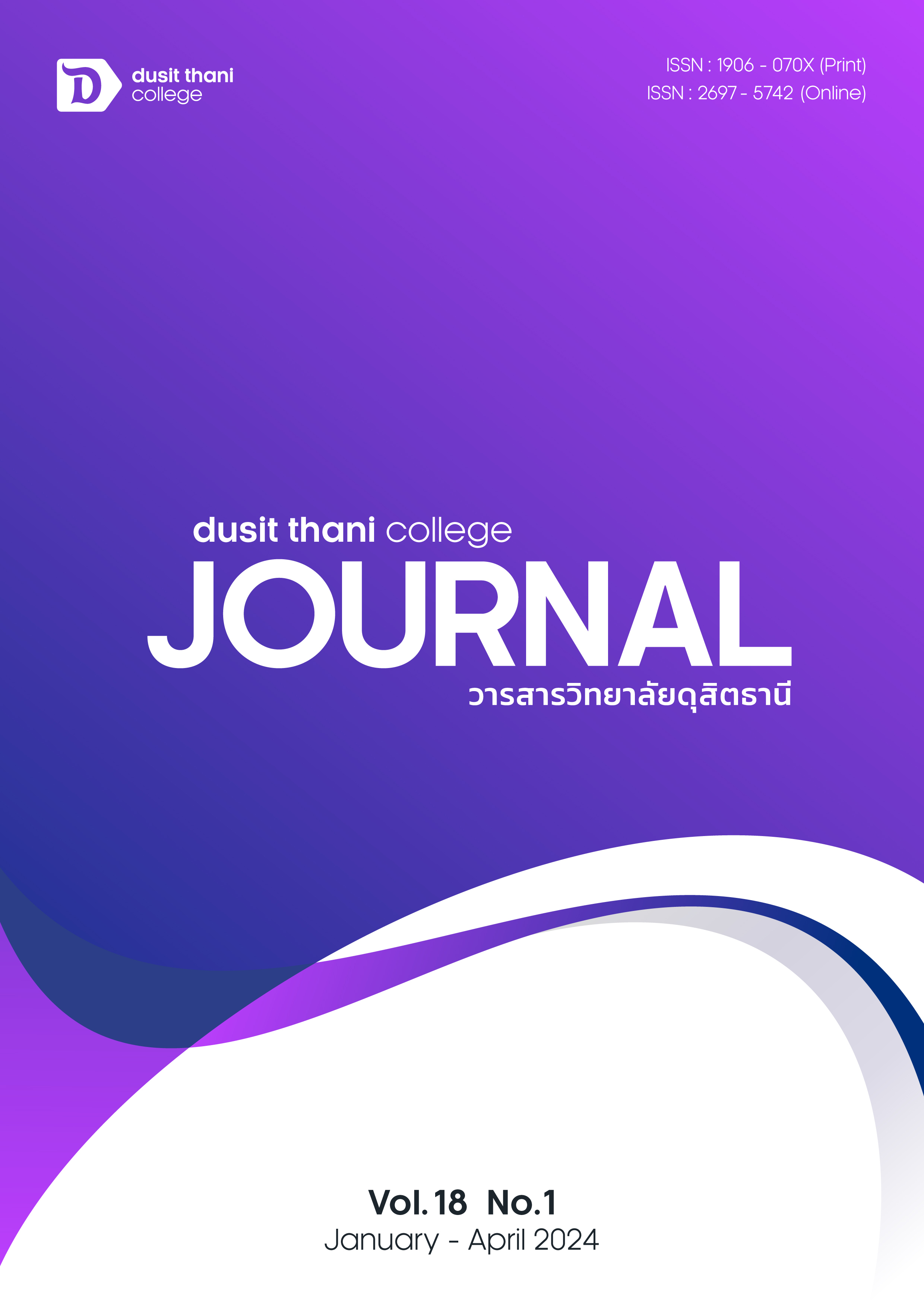ปัจจัยที่มีอิทธิพลต่อความภักดีในสถานที่ท่องเที่ยวจังหวัดราชบุรี ประเทศไทย: การนำเสนอการปฏิบัติการเชิงกลยุทธ์สำหรับการพัฒนาการท่องเที่ยวเชิงวัฒนธรรม
Main Article Content
บทคัดย่อ
จังหวัดราชบุรีซึ่งเป็นจังหวัดทางภาคกลางของประเทศไทยนั้นมีความโดดเด่นในด้านความหลากหลายทาง
ชาติพันธุ์ วัฒนธรรม และศักยภาพทางการท่องเที่ยวอื่นๆ แต่การตระหนักรู้ ความสนใจ และความเข้าใจเกี่ยวกับความหลากหลายทางวัฒนธรรมและชาติพันธุ์นั้นยังไม่ได้รับความสนใจจากชุมชนท้องถิ่นต่าง ๆ และคนไทยเท่าที่ควร ดังนั้นผู้วิจัยได้มุ่งหวังที่จะทำความเข้าใจในปัจจัยต่างๆ และนำเสนอการดำเนินการเชิงกลยุทธ์การท่องเที่ยวเพื่อเพิ่มศักยภาพการท่องเที่ยวเชิงวัฒนธรรมของจังหวัดมากขึ้น การศึกษาเชิงปริมาณนี้มีวัตถุประสงค์ 2 ประการ คือ 1) เพื่อศึกษาปัจจัยที่มีอิทธิพลต่อภาพลักษณ์ของสถานที่ท่องเที่ยว และประสบการณ์การท่องเที่ยวที่น่าจดจำ ที่มีต่อความภักดีของสถานที่ท่องเที่ยวเชิงวัฒนธรรม ในจังหวัดราชบุรี และ 2) เพื่อตรวจสอบสถานการณ์ปัจจุบันของปัจจัยที่มีอิทธิพลต่อความภักดีของสถานที่ท่องเที่ยวในการพัฒนาการท่องเที่ยวเชิงวัฒนธรรมของจังหวัดราชบุรี โดยกลุ่มประชากรเป้าหมายคือคนไทยที่มีประสบการณ์การเดินทางไปยังแหล่งท่องเที่ยวเชิงวัฒนธรรมในจังหวัดราชบุรีมาก่อนโดยใช้วิธีการสุ่มตัวอย่างแบบหลายขั้นตอน ผู้วิจัยใช้แบบสอบถามแบบมีโครงสร้าง 325 ชุดสำหรับการรวบรวมข้อมูล และวิเคราะห์ข้อมูลทางสถิติ โดยการใช้การถดถอยเชิงเส้นอย่างง่าย (SLR) และการถดถอยเชิงเส้นพหุคูณ (MLR)
ผลการวิจัยพบว่าปัจจัยที่มีอิทธิพลอย่างมีนัยสำคัญต่อความภักดีต่อจังหวัดราชบุรีในแง่ของการท่องเที่ยวเชิงวัฒนธรรม ได้แก่ ประสบการณ์ที่แท้จริง ความหมาย วัฒนธรรมท้องถิ่น ภาพลักษณ์ของสถานที่ท่องเที่ยว ประสบการณ์การท่องเที่ยวที่น่าจดจำ และการมีส่วนร่วม แต่ปัจจัยทางด้วยความรู้เป็นปัจจัยที่มีนัยสำคัญน้อยที่สุด ผู้วิจัยสรุปโดยเสนอชุดข้อเสนอแนะสำหรับการดำเนินการเชิงกลยุทธ์เพื่อการพัฒนาการท่องเที่ยวเชิงวัฒนธรรมคือ 1) การเข้าถึงความรู้ทางวัฒนธรรมอย่างเปิดกว้าง 2) โครงการริเริ่มด้านการท่องเที่ยวเชิงสร้างสรรค์ และ 3) การปรับตัวที่เป็นนวัตกรรมและชาญฉลาด ซึ่งข้อเสนอแนะสำหรับการดำเนินการเชิงกลยุทธ์เหล่านี้มีความสำคัญอย่างยิ่งในการยกระดับการมีส่วนร่วมและความเข้าใจในวัฒนธรรมท้องถิ่นและชาติพันธุ์ที่อาศัยอยู่ในส่วนต่าง ๆ ของจังหวัดเพื่อการพัฒนาการท่องเที่ยววัฒนธรรมอย่างยั่งยืนต่อไป
Article Details

อนุญาตภายใต้เงื่อนไข Creative Commons Attribution-NonCommercial-NoDerivatives 4.0 International License.
นโยบายการพิจารณากลั่นกรองบทความ
- บทความวิจัยและบทความวิชาการทุกเรื่องที่จะได้รับการตีพิมพ์ต้องผ่านการพิจารณากลั่นกรองโดยผู้ทรงคุณวุฒิ (Peer Review) ในสาขาที่เกี่ยวข้อง จำนวน 3 ท่าน/บทความ
- บทความ ข้อความ ภาพประกอบและตารางประกอบที่ลงตีพิมพ์ในวารสารเป็นความคิดเห็นส่วนตัวของผู้เขียน กองบรรณาธิการไม่จำเป็นต้องเห็นด้วยเสมอไป และไม่มีส่วนรับผิดชอบใด ๆ ถือเป็นความรับผิดชอบของผู้เขียนแต่เพียงผู้เดียว
- บทความที่จะได้รับการตีพิมพ์จะต้องไม่เคยตีพิมพ์ เผยแพร่ที่ใดมาก่อน และไม่อยู่ระหว่างการพิจารณาของวารสารฉบับอื่น หากตรวจสอบพบว่ามีการตีพิมพ์ซ้ำซ้อน ถือเป็นความรับผิดชอบของผู้เขียนแต่เพียงผู้เดียว
- บทความใดที่ผู้อ่านเห็นว่าได้มีการลอกเลียนหรือแอบอ้างโดยปราศจากการอ้างอิง หรือทำให้เข้าใจผิดว่าเป็นผลงานของผู้เขียน กรุณาแจ้งให้กองบรรณาธิการวารสารทราบจะเป็นพระคุณยิ่ง
เอกสารอ้างอิง
Dodge, Y. (2008). The concise encyclopedia of statistics. Springer.
Hair, J.F., Wolfinbarger, M., Money, A., Samouel, P., and Page, M.J. (2003). Essentials of Business Research Methods.
Kariyapol, T. (2019). The operation of “Zero-Dollar Tours” after their rising popularity in Thailand : A case study of Phuket, a province located in southern Thailand. Sripatum Review of Humanities and Social Sciences. 19(1), 19-31.
Kim, J.H., and Ritchie, J.R.B. (2014). Cross-cultural validation of a memorable tourism experience scale (MTES). Journal of Travel Research. 53(3). 323-335. https://doi.org/10.1177/0047287513496468
Lobo, C., Costa, R. A., and Chim-Miki, A. F. (2023). Events image from the host-city residents’ perceptions: Impacts on the overall city image and visit recommend intention. International Journal of Tourism Cities. https://doi.org/10.1108/ijtc-10-2022-0242
Lončarić, D., Perišić Prodan, M., and Dlačić, J. (2021). Memorable tourism experiences inspired by the beauty of nature. Tourism and Hospitality Management. 27(2), 315–337. https://doi.org/10.20867/thm.27.2.5
Ministry of Tourism and Sports. (2023 Jan, 23). Domestic tourism statistics (Classify by region and province 2022). Retrieved from https://www.mots.go.th/news/category/657
Mousavi, S. S., Doratli, N., Mousavi, S. N., and Moradiahari, F. (2016). Defining cultural tourism. 4th International Conference on Advances in Agricultural, Biological & Ecological Sciences (AABES-16) Dec. 1-2, 2016 London. https://doi.org/10.15242/iicbe.dir1216411
Prougestaporn, A., and Batra, A. (2018). Examining the structural relationship of destination image, tourist eexperience and tourist loyalty: an integrated approach. Dusit Thani College Journal. 12(3), 35-54. https://so01.tci-thaijo.org/index.php/journaldtc/article/view/240931
Ruangpraphan, C. (1996). Basic statistics. Khon Kaen: Printing House, Nana Wittaya.
Rundle-Thiele, S.R. (2005). Exploring loyal qualities: assessing survey-based loyalty measures. Journal of Services Marketing. 19(7). pp. 492-500.
Souza, L. H., Kastenholz, E., Barbosa, M. de, and Carvalho, M. S. (2019). Tourist experience, perceived authenticity, place attachment and loyalty when staying in a peer-to-peer accommodation. International Journal of Tourism Cities. 6(1), 27–52. https://doi.org/10.1108/ijtc-03-2019-0042
Wei, C., Zhao, W., Zhang, C., and Huang, K. (2019). Psychological factors affecting memorable tourism experiences. Asia Pacific Journal Tourism Research. 24, 619–632.
Yamane, T. (1973). Statistics: An Introductory Analysis. (3rd ed.). London: John Weather Hill, Inc.
Yu, C. P., Chang, W. C., and Ramanpong, J. (2019). Assessing visitors’ memorable tourism experiences (MTEs) in forest recreation destination: A case study in Xitou nature education area. Forests. 10(8), 636. https://doi.org/10.3390


